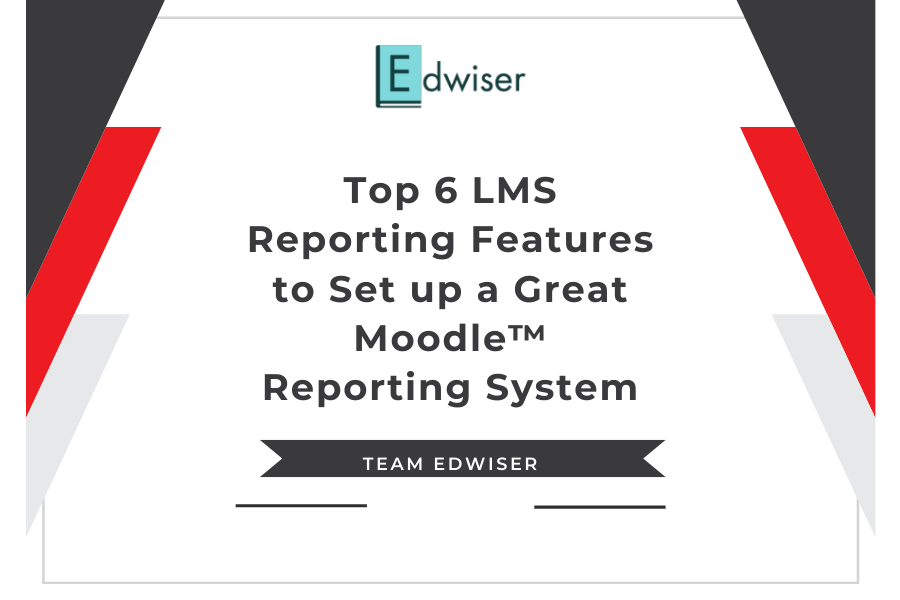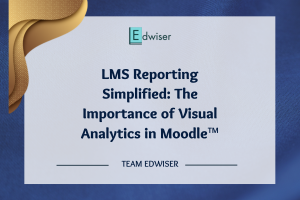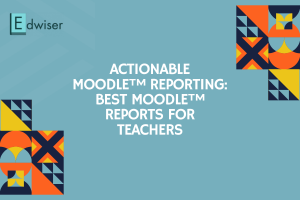Top 6 LMS reporting features to Look for to Set up a Great Moodle™ reporting System
If you think reporting in Moodle™ with plugins from the free plugin directory is a challenge, this article is for you!
Good visibility of your student and overall LMS performance is as important as mere data collection. The in-house Moodle™ reporting plugins might be great and do the job for some Moodle™ users out there. But the majority is not a huge fan of complex reporting!
Is Manual Moodle™ Reporting Worth It?
It is quite a struggle to make sense of reporting in traditional Moodle™ as there is little to no automation. And too much manual reporting can eat into your work schedule.
Imagine spending all your time in tedious reporting and ending up with no actionable information for your LMS. Unfortunately, this happens to many moodlers trying to build a convenient Moodle™ reporting system for their LMS.
Also, manual reporting comes with the risks of human error, data inconsistencies, and a scattered mishmash of data. Nobody wants that! So, what should you look for in an ideal Moodle™ reporting system?
Here are the top LMS reporting features you should consider:
Top 6 LMS Reporting Features for Better Moodle™ Reporting
#1 Student Engagement Tracking
The key to actionable reporting is to track student behavior on your LMS. So, it is important for your Moodle™ reporting plugin to measure crucial learner engagement metrics such as course participation, course completion, time spent on courses, and in-course activities.
This is particularly useful to gauge how effectively your students interact with your training modules. And is one of the best ways to further optimize your course content. The ideal Moodle™ reporting plugin should help you easily measure the impact of your courses. And check if the modules are translating to desired student behavior and learning outcomes.
The tool should also be able to tell you which students are performing well and which ones need more coaching.
Other user behavior metrics such as time spent on LMS, in general, can also help to establish meaningful elearning engagement patterns.
#2 Consolidated Reporting Interface
Too much data without any structure crowding your LMS is as good as “All talk, no substance” – There’s a lot of talking, but unfortunately, nothing much to say. All it does is take up your time and resources.
A good reporting plugin ensures you don’t get overwhelmed due to huge piles of data sprawled across your LMS. It easily lets you cut through all the noise and neatly presents the most relevant data on a holistic dashboard.
Consolidated dashboard-based Moodle™ reporting gives you a brief overview of your LMS performance. This is great for bringing all the focus data points together in one place and getting quick insights for making better decisions. In addition, all your fundamental LMS reports are visible to you in one glance, making data analysis and comparison much easier as well as faster.
#3 Actionable Visual Analytics
Nothing beats the clarity and in-depth insights provided by visual analytics. Also, it is hands down one of the best ways to make your LMS reporting interesting. But unfortunately, data paralysis and cognitive overload are for real, and they can get you after a point making Moodle™ reporting an overly tiring process.
Visual analytics help a great deal in getting better data visualizations of your elearning data.
Imagine seeing LMS numbers dumped in a tabular column versus numbers speaking to you in the form of a simple line graph. What’s better? It’s a no-brainer – of course, the graph!
The spikes, plateaus, and dips do the much-needed storytelling and convey actionable insights quickly. For example, if you see a sharp drop at a specific point in course completion for one of your courses. It means there is a catch-22 situation at that point and the course probably needs a relook.
#4 Adequate LMS Data Filtering Options
This is another mandatory LMS reporting feature that has to be on your list.
A good reporting plugin offers flexibility when it comes to data presentation. Therefore, it should not only provide a quick consolidated overview at a glance but also let you easily drill down to specific metrics for detailed insights.
You can quickly sift through all the major reports displayed on the dashboard and dig deeper selectively based on your requirement. If a particular report needs your attention, you can easily zoom in by adding required filters to get more actionable information.
These filters can help you learn about student behavior inside your courses at a micro-level.
For example, adding cohorts and course group filters can help you get a segmented view of student engagement in specific clusters of courses. Or you can also easily compare student progress across different courses.
#5 Quick & Easy Custom Reports Generation
Readymade reports in Moodle™ are convenient and time-saving. But sometimes, the standard Moodle™ reports may not reveal the insights you need. This is when the custom reporting need arises to get data tailored to your specifications.
Custom Moodle™ reports are great for fine-tuning and personalization of LMS reports. They let you have custom elearning targets, pick, choose and measure the metrics of your choice in a single report.
Moodle™ provides two ways to generate custom reports – with SQL queries and without SQL queries, the latter being more complex and suitable for seasoned tech Moodle™rs. So, make sure the reporting plugin you choose provides an easy way to create custom reports.
#6 LMS Report Scheduling & Automation
Reviewing key progress reports periodically is a must to spot glitches and negative trends on your LMS. So, instead of accessing them manually, scheduling these reports automatically to your mailbox at fixed intervals is ideal.
This way, you can effortlessly weed out repetitive tasks, save time and make better use of your resources. They can be diverted toward creating better courses and activities too.
Conclusion
Building a great Moodle™ training program for your students starts with insightful reporting.
The above parameters are absolute must-haves in any Moodle™ reporting solution you pick. So, ensure your evaluation doesn’t miss these to set up a great Moodle™ reporting solution.
If you want to see your next online learning class in Moodle™ brimming with productivity, first, note these. And also, we’d recommend trying out the Edwiser Reports plugin because it checks all the above boxes 🙂 Another good news – It’s fully compatible with Moodle™ 4.0 too!





